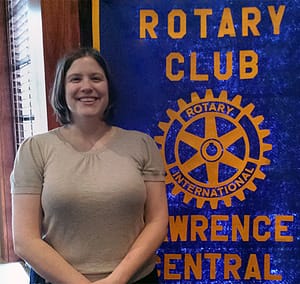 Dezeree Hodish spent the summer of 2013 in Moscow, Russia, as an intern in the United States Embassy there. Lawrence Central Rotary helped make her adventure possible with a grant to help pay for her airfare. Last week, Dezeree told club members about her internship.
Dezeree Hodish spent the summer of 2013 in Moscow, Russia, as an intern in the United States Embassy there. Lawrence Central Rotary helped make her adventure possible with a grant to help pay for her airfare. Last week, Dezeree told club members about her internship.
The residence in which interns and short-term contractors are housed is located many miles away from the US Embassy itself in Moscow. The collection of pre-fab townhouses are made in America and furnished just as American homes would be furnished. As an intern, Dezeree had the advantage of living in that free housing.
To get to work, Dezeree could take the daily chartered bus to the embassy in downtown Moscow, a 1.5 to 2 hour ride one way. If she wanted to get the embassy more quickly, she could take a shuttle to the Metro, ride the Metro into the city, and then walk about five blocks to the Embassy—an hour-and-a-half journey. The lengthy commute was the most difficult part of the internship experience.
Most of Dezeree’s hours were spent in the embassy compound itself. The compound is guarded by Russian guards and high gates. On the interior, US Marines are present. The Russian Embassy is considered to be the second most secure in the world, next to embassy in Baghdad. The United States hires many Russian nationals to work at the embassy.
Dezeree was one of ten summer interns from America working at the embassy. The application process and security review were long and rigorous; she applied in the fall of 2012 for the summer 2013 internship. Her assignment was in the press office of the press section of the Public Affairs division.
Dezeree’s job was to read the Russian media and write English summaries for the ambassador and U.S. Department of State community. The object of her work was to convey the mood of the Russian press to the Ambassador. Dezeree has advanced proficiency in the Russian language in connection with her doctoral studies in Russian history at KU, and she was surprised to find that very few of the Americans on staff at the Embassy could speak Russian proficiently. All her writing was done in English. Once she was finished with a piece, translators translated her ideas into the Russian language.
Edward Snowden arrived in Russia during Dezeree’s time in Moscow, so she spent significant time reading what the Russian press thought about him. She noted a change in the Russian media after Snowden came which she attributed to a tightening of state control and increased censorship. Dezeree also planned social media campaigns presenting the point of view of the United States. In preparation for the Olympics held in Russia last winter, the Embassy press office focused on promoting human rights awareness.
In addition to her work in the press office, Dezeree was assigned to monitor a Russian news crew, helped to plan a Fourth of July party at the ambassador’s residence, worked with the American culture camps, and met her counterparts in the Russian foreign service. She was surprised and especially pleased that she had personal access to the Ambassador himself during her stay.
Since all personal services were available to employees within the Embassy compound, staff had little reason to leave and get to know Moscow. Dezeree spent her free time exploring the city, however. She enjoyed the murals and artwork in the metro stations, saw a ballet in the Bolshoi Theater, visited Red Square and its tourist attractions, and explored the many public gathering places in Moscow such as Gorky Park and its gardens. She did not visit a Rotary club there because of a recently passed Russian law that places restrictions on Russian NGOs’ interactions with foreign organizations. She commented that the stereotype of Americans in Russia is that we are rich and selfish, but many of these stereotypes are challenged when Russians and Americans interact on a personal level. She also told Rotarians that Putin was very popular in Russia, especially in smaller towns and villages.
Dezeree continues her commitment to public affairs as she works on her dissertation. She is currently employed by the State of Kansas as a Fiscal Analyst in the Legislative Research Department in Topeka.